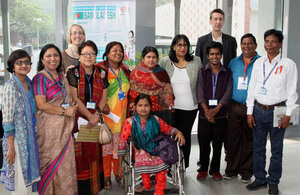UK’s International Development Minister Baroness Verma concludes visit to Bangladesh
Baroness Verma, the UK’s Minister for International Development has concluded her three day visit wishing a stronger Bangladesh who can lead its own development.

Met with MJF
Baroness Verma, the UK’s Minister for International Development has concluded her three day visit wishing a stronger Bangladesh who can lead its own development. During her stay, she visited UK funded projects in Dhaka to hear from beneficiaries how UK aid is transforming lives.
She met a range of people including development and private sector partners, civil society representatives, as well as some of the many people benefitting from DFID programmes.
At the end of her visit, Baroness Verma said:
“Over the past few days I have seen first-hand how UK aid is making a difference to the lives of so many people across Bangladesh.
“Disability inclusion remains a priority for the UK to ensure no one is left behind. UK aid, through the Centre for the Rehabilitation of the Paralysed, is providing people with disabilities with medical care, free vocational training and the rehabilitation support needed to help them back into society and to continue working.
“I have met women survivors of acid attacks and saw how the Acid Survivors Foundation helped them to deal with this huge trauma and gain the confidence to carry on with their lives. My role as Ministerial Champion for Tackling Violence against Women and Girls Overseas means I am working with colleagues across government to ensure Britain continues to show global leadership in efforts to end violence against women and girls.
“The new Global Goals present a vital opportunity for Bangladesh to lead its own development towards middle income status and ensure that no one is left behind. This means working with the people of Bangladesh to help transform the lives of the poorest, most vulnerable and most marginalised.”
Notes to editors
-
The UK government is the largest bilateral donor in Bangladesh, investing over £250 million on programme spend in 2013-14. Our programmes have helped to:
- Lift 1.5 million people out of extreme poverty by providing training or assets to help people set up business by the end of 2015;
- Helped 1.4 million farmers and small business resulting in net increase in income of £100 million;
- 500 000 women will give birth safely and their babies will receive improved care by end 2015;
- 500,000 boys and girls will have been supported to complete primary education by 2015;
- Over 1.5 million people have access to safe drinking water and 4 million people have access to improved sanitation.